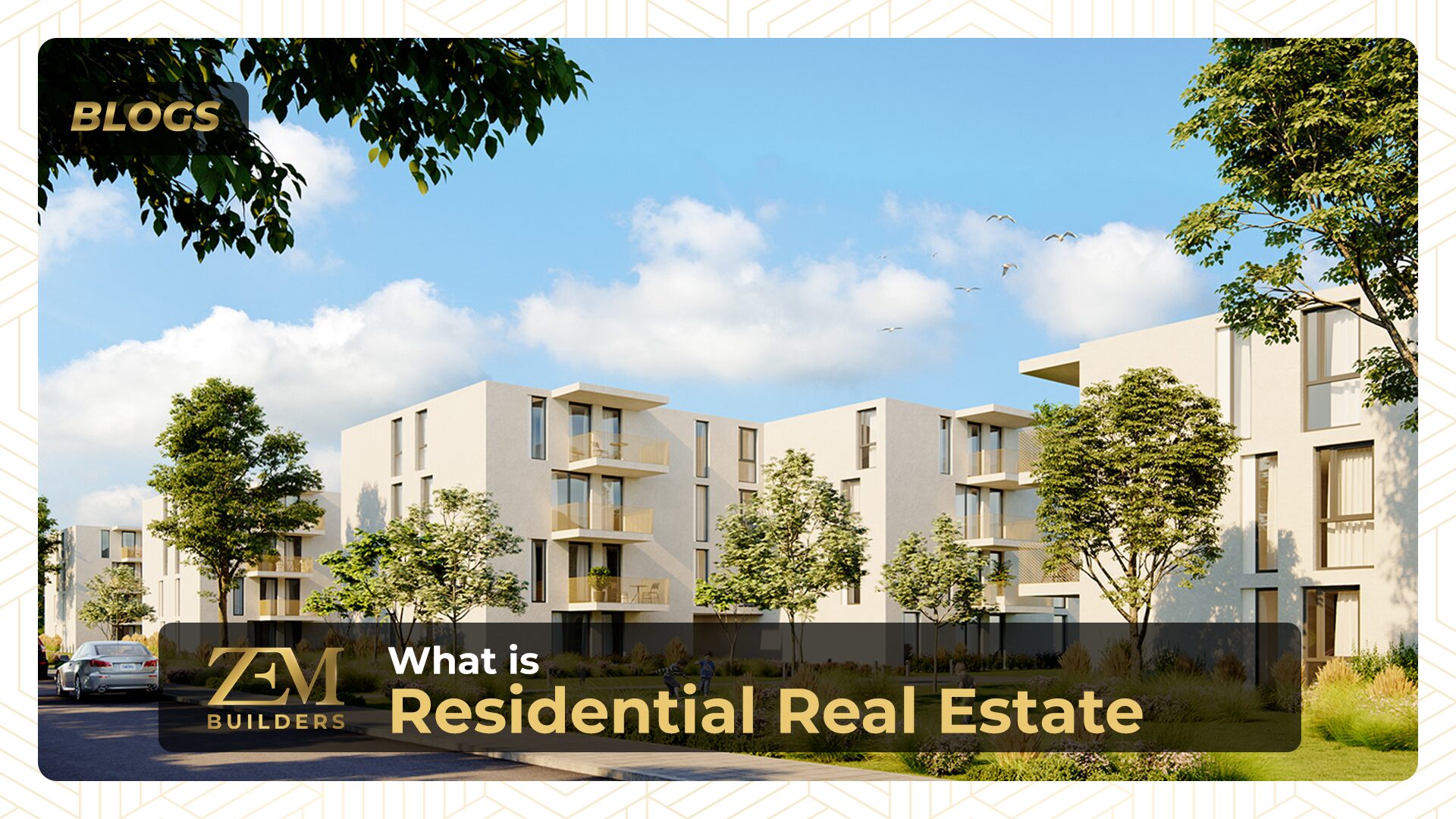What is Residental Real Estate

Real estate is a term we hear a lot but what does it actually mean? In simple terms, real estate refers to land and the buildings on it, along with its natural resources.
Real estate plays a critical role in the economy, acting as a major driver for development and wealth creation. However, when we dive deeper into the sector, we encounter different categories of real estate, each serving unique purposes—residential real estate being one of the most prominent.
Residential Real Estate
Residential real estate refers to properties that are designed specifically for people to live in. It can be anything from a single-family home to a multi-story apartment building.
The primary purpose of these properties is habitation, as opposed to commercial real estate which is used for business purposes. This distinction is key, as the buying, selling and investing in residential real estate operate in a different market with different priorities and dynamics.
Different Types of Residential Real Estate
Single-Family Homes
A single-family home is a stand-a-lone building designed to house one family. These are the most common types of residential properties and offer the most privacy and space.
Multi-Family Homes
Multi-family homes include duplexes, triplexes or apartment complexes that house multiple families under one roof. They are popular among investors because they can generate rental income from multiple tenants.
Condominiums
Condos are individual units within a larger building or community. Condo owners own their units but share ownership of common areas like pools, gyms and other amenities.
Townhouses
Townhouses are multi-floor homes that share one or two walls with adjacent properties. They combine the benefits of single-family homes and condos, offering more privacy than apartments while sharing walls with neighbors.
Apartments
An apartment is a single unit within a multi-unit building. Apartments are typically rented rather than owned and they vary in size, layout and amenities.
Looking to invest in an apartment? Have a look at the list of the projects that ZEM Builders is offering in the vicinity of Rawalpindi and Islamabad.
Luxury Real Estate
Luxury real estate refers to high-end properties that are often larger, more expensive and equipped with top-of-the-line amenities. These homes are designed to offer comfort, privacy and a luxurious lifestyle and they are often located in premium locations.
How Residential Real Estate Works
Understanding how residential real estate operates involves knowing the buying and selling processes, as well as the key players in the market.
The Buying Process
When buying residential real estate, individuals typically go through several steps. First, they search for a property, usually with the help of a real estate agent. Once they find the right home, they make an offer, negotiate the price and proceed with the closing process. Buyers often secure a mortgage to finance the purchase.
The Selling Process
Selling a home follows a similar process but in reverse. The seller lists their property, usually through a real estate agent and entertains offers from potential buyers. After negotiating the price, they proceed with the closing, transferring ownership to the buyer.
The Role of Real Estate Agents
Real estate agents are intermediaries who help buyers and sellers navigate the complex market. They assist with property searches, negotiations and paperwork, making the process smoother for all parties involved.
Residential Real Estate Market
The residential real estate market is constantly evolving influenced by various factors that affect property values and availability.
Current Market Trends
Market trends fluctuate based on economic conditions, interest rates and housing demand. Some markets experience booms where housing prices skyrocket, while others may face downturns, making it a buyer’s market.
At present the Pakistani real estate market is struggling despite its highest performing years in around 2019. Big names suggested that it was all due to political instability hence positive predictions were made till elections. Elections took place and it has been more than 6 months, barely any fluctuation.
Factors That Influence the Market
Several factors impact the residential real estate market, including the economy, government policies, interest rates and population growth. For example, low interest rates typically encourage more buyers to enter the market, driving up demand.
Housing Demand and Supply
The balance between housing demand and supply plays a critical role in determining property prices. If demand outpaces supply, prices rise. Conversely, when supply exceeds demand, prices tend to fall.
In Pakistan, the demand suddenly died at around 2021 and since then real estate sector has not been the same.
Residential Real Estate Investment
Investing in residential real estate can be a lucrative venture if done correctly. There are numerous strategies that investors use to maximize returns.
Why Invest in Residential Real Estate?
Residential real estate is considered one of the safest and most stable forms of investment. It provides a tangible asset that can appreciate in value over time and investors can earn income through rental properties.
Want to explore residential real estate options in Rawalpindi? Explore our latest project ZEM Ark located in Bahria Business District, Phase 8 Rawalpindi.
Potential Returns and Risks
While the potential returns in residential real estate can be significant, there are also risks. Market fluctuations, maintenance costs and problematic tenants can impact profitability. Investors must carefully assess these risks before committing to a property.
Popular Strategies for Investment
Common strategies for investing in residential real estate include buying rental properties, flipping houses for a quick profit and purchasing properties in emerging markets where prices are expected to rise.
Residential Real Estate vs. Commercial Real Estate
Residential real estate is used for living purposes, while commercial real estate is designed for business activities. Residential properties tend to be smaller while commercial buildings are often larger and require more capital.
Investment Potential Comparison
Investing in residential real estate is generally seen as less risky with more stable returns. Commercial real estate, while offering higher potential profits, comes with increased risk and more complex management.
Legal and Zoning Differences
Zoning laws for residential and commercial properties differ significantly. Residential properties must meet specific local housing regulations, while commercial properties have stricter requirements based on their intended use.
Benefits of Owning Residential Real Estate
Owning residential real estate comes with a host of benefits that make it a popular choice among investors and homeowners alike.
- Real estate is typically seen as a long-term investment. Over time, property values tend to rise, providing owners with a secure investment that can be passed down through generations.
- Homeowners often enjoy tax deductions, such as mortgage interest and property tax deductions which can reduce the overall cost of owning a home.
- Owning rental properties can generate passive income, providing a steady stream of revenue without requiring full-time effort.
- Financing a home purchase is a significant part of the process and there are various options available for buyers.
- There are different types of mortgages including fixed-rate, adjustable-rate and interest-only loans. (Bank Loans for Pakistan)
- Buyers are typically required to make a down payment which can range from 5% to 20% of the property’s price. Closing costs include additional fees such as legal and appraisal fees.
Challenges of Residential Real Estate
Like any investment, residential real estate comes with its own set of challenges that need to be considered.
Market Fluctuations
Property values can be unpredictable, influenced by broader economic trends. While long-term investment usually results in appreciation, short-term market fluctuations can pose risks.
Maintenance and Management Costs
Owning a home or rental property requires ongoing maintenance which can be costly. Owners also have to manage tenants and handle repairs which can add to the overall cost of ownership.
Legal Considerations
Residential real estate is subject to various legal obligations such as property laws, zoning regulations and landlord-tenant agreements. It is crucial to be aware of these laws to avoid potential legal issues.
The Role of Technology in Residential Real Estate
Technology is rapidly transforming the real estate industry, making it easier for buyers, sellers and investors to navigate the market.
Real Estate Websites and Apps
There are various big names in the real estate industry globally and in Pakistan that have made an impact digitally. Such platforms have revolutionized the way people search for homes, allowing for easy browsing, filtering and comparison of properties.
Virtual Tours and Online Listings
Virtual tours allow buyers to explore properties from the comfort of their homes while detailed online listings provide crucial information about a property’s features and history.
Smart Home Technology
Smart homes, equipped with automated lighting, heating and security systems are becoming more popular. These technologies can increase property values and attract tech-friendly buyers.
Future Trends in Residential Real Estate
The future of residential real estate is shaped by several emerging trends that will continue to evolve in the coming years.
Sustainable and Eco-Friendly Homes
As environmental awareness grows, more buyers are seeking energy-efficient and eco-friendly residential apartments. These properties reduce energy consumption and are often built with sustainable materials.
Urban vs. Suburban Living
The rise of remote work has led to a shift from urban to suburban living, as people seek more space and affordability outside of crowded city centers.
Remote Work and its Impact on Housing
With the increase in remote work, homes now serve dual purposes acting as both living spaces and offices. This trend is influencing housing design and location preferences.
FAQs
What is the difference between a condo and an apartment?
A condo is owned, while an apartment is typically rented.
Is residential real estate a good investment?
Yes, it offers long-term stability and potential for passive income. It is a very good option as it can be utilized for own living too.
Can technology impact the real estate industry?
Absolutely! Technology has streamlined buying, selling and managing properties, from virtual tours to smart home innovations.
Conclusion
Residential real estate is a vital part of the economy, offering opportunities for homeownership, investment and community development. Whether you’re buying a home to live in or looking for a property to invest in, understanding the ins and outs of residential real estate can help you make informed decisions.

